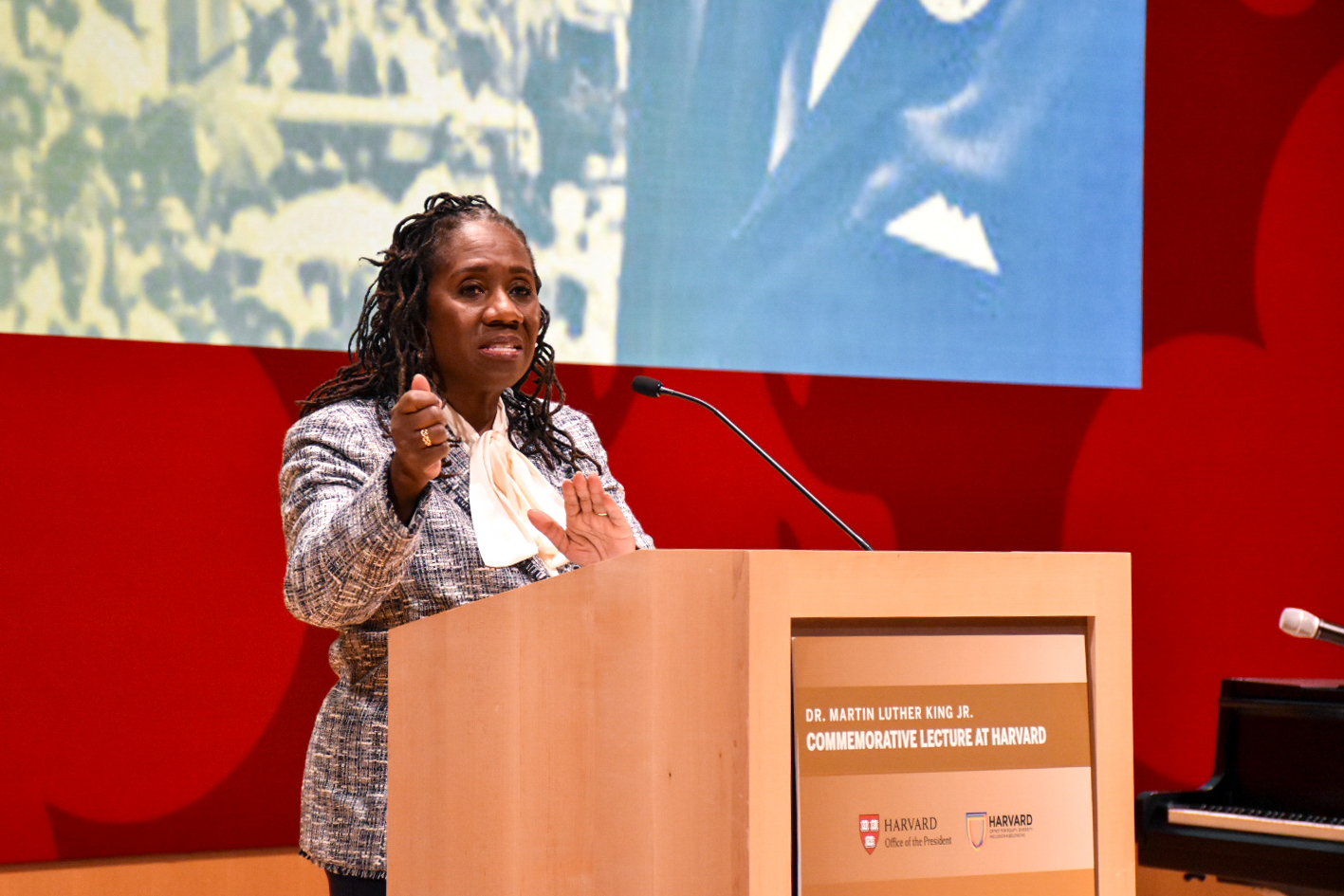
News
Summers Will Not Finish Semester of Teaching as Harvard Investigates Epstein Ties

News
Harvard College Students Report Favoring Divestment from Israel in HUA Survey

News
‘He Should Resign’: Harvard Undergrads Take Hard Line Against Summers Over Epstein Scandal

News
Harvard To Launch New Investigation Into Epstein’s Ties to Summers, Other University Affiliates

News
Harvard Students To Vote on Divestment From Israel in Inaugural HUA Election Survey
Sherrilyn Ifill Urges Attendees to Reimagine Democracy at Annual MLK Lecture

Sherrilyn Ifill, the former president of the NAACP Legal Defense Fund, said a healthy democracy could not coexist with white supremacy and systemic racism during Harvard’s annual Dr. Martin Luther King Jr. Commemorative Lecture on Tuesday.
Hundreds of people packed Klarman Hall at Harvard Business School to hear Ifill deliver her remarks. The annual lecture recognizes individuals who have embodied the values and furthered the mission of Dr. King, according to the event’s description.
Before Ifill delivered the lecture, Madison R. Webb ’25 and Olutimilehin I. J. Esan ’27 performed a rendition of Cynthia Erivo’s “Stand Up,” garnering a standing ovation from the audience. Harvard President Alan M. Garber ’76 followed with brief welcome remarks.
In her keynote speech, which was titled “Reimagining a New American Democracy,” Ifill highlighted the importance of local civic engagement and the role of universities in “carrying forward the democracy project.”
“We are here because far too many have convinced themselves that the disease that is embedded in the DNA of America – racism and white supremacy — can coexist with healthy democracy,” Ifill said. “It cannot.”
Ifill also reflected on her experience growing up as one of 10 children in her family during the civil rights movement.
“My father ensured that we watched every documentary about the movement,” she said.
As a child, she said she always thought about the future and how to make change in the present.
“The devastation of losing my mother when I was almost six, just a few months after the assassination of Dr. King, left me always dreaming,” Ifill said.
Ifill said she believes “civil rights lawyers and activists should be in the center of conversations about the direction of this country, its politics, and its future.”
“I asserted my right — even sometimes throwing elbows — to join discussions in rooms closed off usually to civil rights leaders, and forced my way onto TV shows on which we were rarely invited,” Ifill added.
Ifill said that the goal is not to entirely eliminate racism, calling it “a condition that lives in our national bloodstream.”
Instead, she said, it is crucial to create a “national democratic health regimen that will protect our nation against the worst consequences of white supremacy.”
Ifill also referenced the presidential election, which was one week away from Tuesday, and drew attention to the “perilous moment” attendees were at in American politics.
“The good news is we’ve rebuilt this country before,” she said. “We did it after the Civil War, which is why I'm launching this 14th Amendment Center.”
Howard Law School announced in June 2023 that Ifill would chair the school’s new 14th Amendment Center, a multidisciplinary center focused on promoting equality. Ifill taught a course on the 14th amendment as a visiting professor at the Harvard Law School last year.
Ifill also encouraged attendees to be imaginative while building a better democracy.
“That’s what we are being called to do,” Ifill said, “To imagine something we’ve never seen, and to imagine so fiercely and work so hard and believe so faithfully that we make even a portion of that imagination become a reality.”
“The question for us is whether we have the democratic imagination to make real change,” Ifill added.
—Staff writer Katie B. Tian can be reached at katie.tian@thecrimson.com.
—Staff writer Samantha D. Wu can be reached at samantha.wu@thecrimson.com.
Want to keep up with breaking news? Subscribe to our email newsletter.
